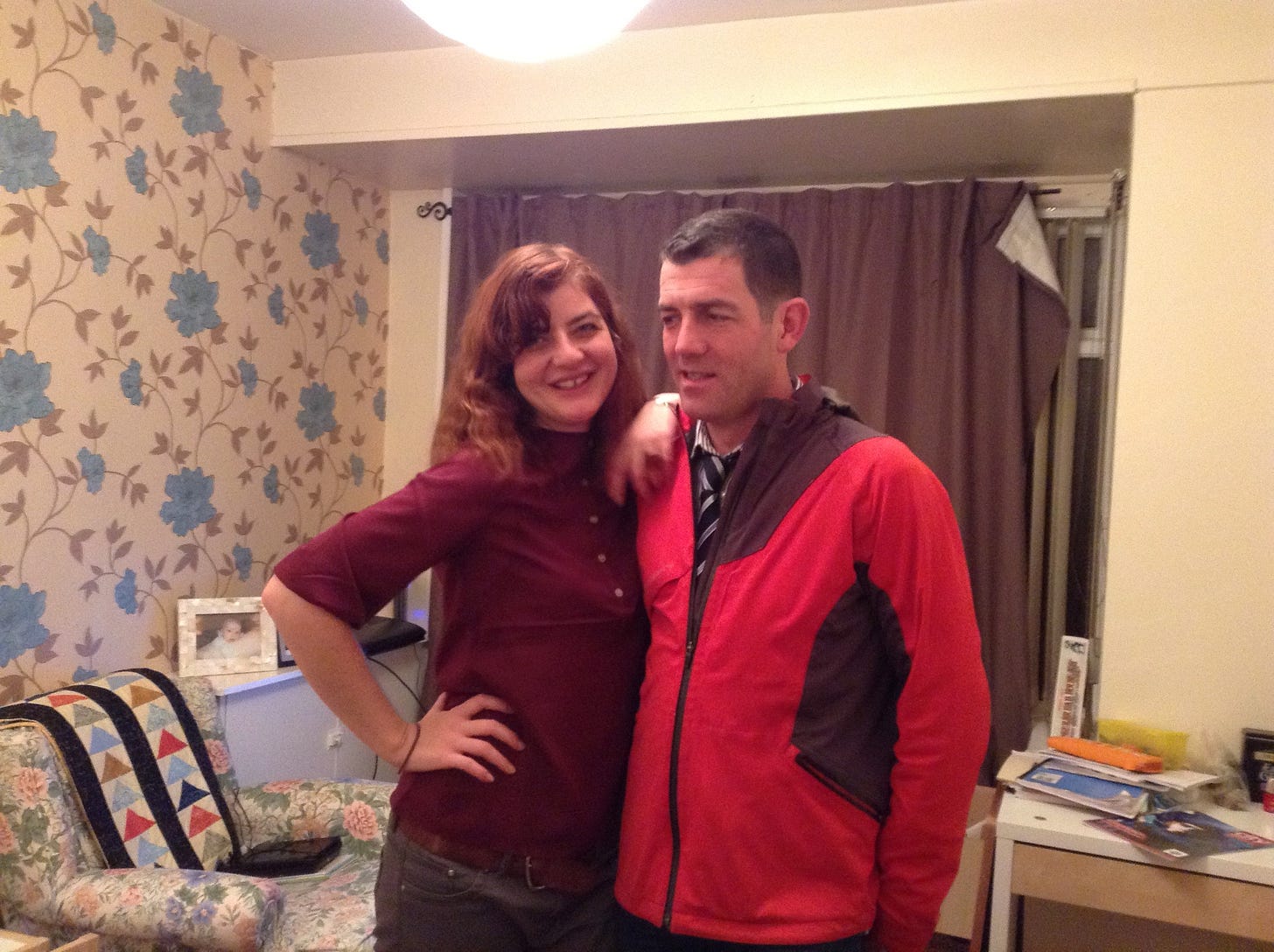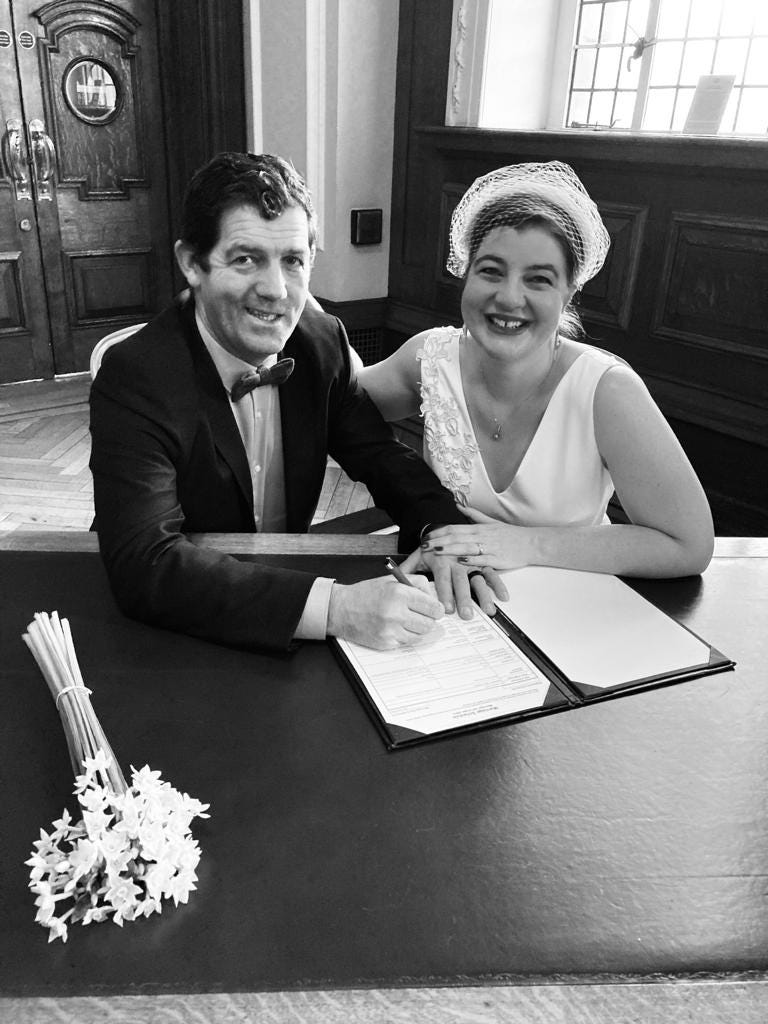On the afternoon October 8 2013, I walked into the Crown Bar in Belfast with a group of Spanish people to whom I was teaching English. Immediately upon entering the place, my phone rang and I went outside to answer it, leaving my students to order for themselves at the bar. The call was from was my mother, who was visiting me at the time, and taking care of my four year old son while I was with my students. Just six weeks earlier, I had left my husband in Berlin, fleeing his descent into mental illness and substance abuse to start over, alone and unemployed, with my kid in Belfast.
When I walked back into the pub after taking the call, I immediately noticed there was something of a kerfuffle involving a short, manic, dark-haired Irishman. He seemed to be booming orders to both my confused Spaniards, who had failed to muster enough English to order pints, and the barman. Time suddenly slowed. The loud Irishman turned and noticed me, and the first words out of his mouth were:
“Who the fuck are you!??!”
To which I replied, “I’m their English teacher.”
To which he replied, “Well, you’re doing a shit job.”
Reader, last Saturday I married him.

In my defence, within about a week of our meeting he had filled in the gaps between what he had said out loud and what he had been thinking: that when he laid eyes on me it was like the universe had shrunk down to a tiny point with me at the centre of it, which prompted the surprised and urgent demand that I tell him who I was. Soon we were madly in love. But to those looking on, it must have seem inadvisable. Total rebound story.
Yet somehow, we endured. Nine years on, we have been through every possible permutation of crisis, we started a business together, we got to know one another’s families. We built a life together.
There are many things I could say about this man, but given the subject of this newsletter — the intersection between culture, personal lives, and politics — it seems most relevant to say what he taught me. And that can be summed up with this: if at all possible, you should definitely date someone who is from a different socio-economic class. (You do not, however, have to go as far as I did and get married to that person.)
I, and almost everyone I knew at the time, inhabited a white-collar world. The only work we do with our hands is type. My father, though he came from a working-class family, could not even hammer a nail and grew up to be a poet. My mother was from similarly humble roots but embraced a bohemian lifestyle that focused on literature and culture, not hard graft or money.
Brian, though he shared a nationality and a religion with my father, and is the same age as me, could not have had a more different upbringing than I did. The eldest of a big family, he spent his summers working on his grandparents farm cutting turf and churning butter, and his after-school days helping with his father’s lorry business, painting trucks and sweeping the yard. He grew up around labourers and truck drivers and bricklayers. At the age of the 13, he started work in the kitchen of a busy hotel and never stopped working from that day until now, three decades later. While kids in the world I grew up in were talking about what they watched on MTV or Oprah, or what they bought at the shopping centre with their allowance from their middle-class parents, he was getting himself to and from work where he spent long weekend nights chopping onions and carrots for a terrifying old chef who ruled the kitchen with an iron fist. He left home at sixteen, with no educational qualifications, but went on to be an incredibly accomplished chef working for some of the most famous celebrity chefs in the world. He is one of the smartest people I have ever met, self-taught, a constant seeker of knowledge. He gave up the drink years ago, but can tell you in great detail how the different minerals of the soil of one part of France over another part of France will change the nose or the mouthfeel of a wine. He can break down an entire deer and bone a fish with the precision of a surgeon. He can tile a floor and put in an extraction unit and change your tyre and reverse a trailer and sail a boat.
Meeting Brian and then starting a business with him brought about a sea change in the way I see the world. Because up until then, I had been wholly ignorant of the reality of labour. Physical work. Generating your own income from standing in one place, making things with your hands and selling them to people for money. I’m slightly embarrassed to even mention this, because I fear it seems like I’m trying to sound hard when actually it shows me up to be cosseted creature that I am, but once I peeled so many soft-boiled eggs in preparation for taking our food truck to a music festival that I had hundreds of tiny little pin-pricks in my thumb from the egg shells. It was hardly coal-miner’s black lung, but it was a first for me.
Then you take that physical labour, and you layer on top of it a heavy burden of government regulation, designed — they say — to protect the people who work for you or the customers (both things, I must add, sound perfectly reasonable until you understand just how they can be exploited by anyone with a grudge). Then you add the reality of heavy taxation that means that even though you imagine yourself to be an independent operator striving only to give your customers the best possible product, actually you work mainly to pay the government tax bill and that tax bill could easily mean you can’t even afford to pay yourself. Once you have lived that reality, your old assumptions (minimum wage is necessary and good! Capitalism is terrible and government protects you!) get called into question.
I have always had an inkling of just how tremendously easy my life was — in a physical sense — compared to my older relatives and ancestors. I remember in my first term at university, 18 years old and living in a flat Dublin, where I read poetry and smoked hash in my little bedroom, using a birthday card from my great-aunt to tear up into roaches for my joints. My aunt was a woman who had worked as a mill girl since she was barely out of primary school, never married or had children of her own. She had sent me a few quid along with the card which said she had prayed for me, and there I was, smoking it. Even in my teenage self-regard, that gave me pause and made me say my own little prayer of gratitude for my life of indolent pleasure.
But my relationship with my now-husband really brought home how physical work isn’t something from the past. It is the cement foundation of all the incidental activities that make our lives pleasant and functioning. And, in the world I had always lived in, it is done by others: the hairdressers and nail technicians, the pothole fillers and the linemen, the garbage collectors and the sewer pipe cleaners; the chefs and pot-washers; the warehouse workers and truck drivers who deliver our never-ending stream Amazon packages. Be under no illusion: the “anti-government activists” that the US Department of Justice is going after and the white van drivers sneered at by North London Labour MP’s, ARE these people. And they work, lockdown or no lockdown, feeding, cleaning and keeping warm the chattering classes.
The unacknowledged chasm between classes is the biggest fault-line in English-speaking societies, but most of the educated lefties on places like Twitter spend precisely zero time thinking about those beneath them on the socio-economic ladder except to use them as window dressing for their own political agenda.
But I digress. I got married on Saturday to a man who, like me, is a survivor. We are living proof that two people with more baggage than a cruise liner, from vastly different worlds, can not just see eye-to-eye, but cooperate and cohabit and love each other. And he makes me laugh. And he wants me to be the best I can be. And I want the same for him.
Enjoy this poignant song which is my husband’s favourite.





What a beautiful story. Thanks for including this in your year-end article.
This is great, all of it, but especially the part about the workers of this world, the people who have to really graft just to get through.